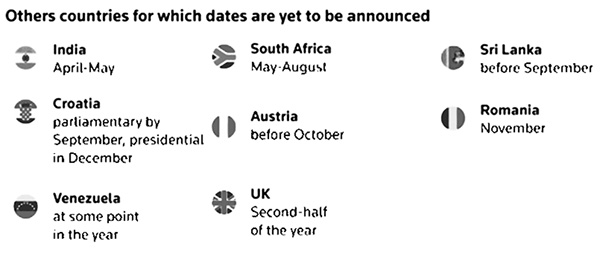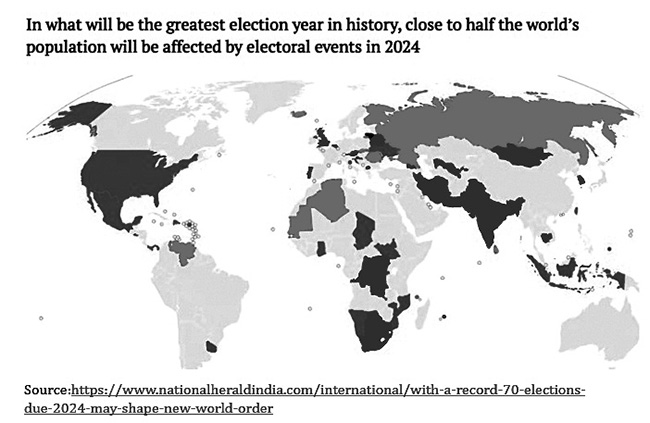 In the global political landscape of 2024, Reuters provides a comprehensive overview of key elections shaping the economic and geopolitical landscape across diverse regions. From Europe, where the rise of Eurosceptic far-right parties poses challenges to the European Union’s integration, to Russia, where Vladimir Putin is set for another term amid heightened tensions with the West, the report navigates through critical elections in Turkey, India, Mexico, South Africa, the United States, Britain, and Venezuela. The analysis underscores the potential market risks associated with each election, ranging from currency fluctuations, inflation and government bond concerns to geopolitical ramifications affecting international relations. As voters cast their ballots, the Reuters brief illuminates the intricate intersections of politics and economics, offering valuable insights into the potential trajectories of these nations and their impact on the global stage.
In the global political landscape of 2024, Reuters provides a comprehensive overview of key elections shaping the economic and geopolitical landscape across diverse regions. From Europe, where the rise of Eurosceptic far-right parties poses challenges to the European Union’s integration, to Russia, where Vladimir Putin is set for another term amid heightened tensions with the West, the report navigates through critical elections in Turkey, India, Mexico, South Africa, the United States, Britain, and Venezuela. The analysis underscores the potential market risks associated with each election, ranging from currency fluctuations, inflation and government bond concerns to geopolitical ramifications affecting international relations. As voters cast their ballots, the Reuters brief illuminates the intricate intersections of politics and economics, offering valuable insights into the potential trajectories of these nations and their impact on the global stage.
To evaluate the potential impact of these global elections on Sri Lanka’s upcoming political landscape, it is imperative to delve into the economic trajectories pursued by the primary political entities participating in the elections. Contrary to past practices where Presidential elections took precedence, there are speculations that the impending general elections will precede other electoral events. Four predominant political forces have emerged on the forefront, namely the United National Party (UNP), Sri Lanka Podujana Peramuna (SLPP), Samagi Jana Balavegaya (SJB), and Jathika Jana Balavegaya (JJB). Each of these forces holds distinct economic policies and visions, making a thorough comprehension of their respective stances crucial for anticipating the potential repercussions on Sri Lanka’s political and economic landscape.
A slight distinction exists between the United National Party (UNP) and the Sri Lanka Podujana Peramuna (SLPP), with their current collaborative governance with shared portfolios and a lack of overt contradictions. Both parties, led by experienced leaders, advocate for similar economic policies, although the SLPP adopts a nationalistic facade. Notably, the key disparity lies in the SLPP’s adeptness in making emotional appeals, strategically leveraging Sinhala votes and invoking a sense of ultra-nationalism. In contrast, the UNP, under Ranil’s leadership, takes the lead in courting minority votes. The intricate dynamics of emotional appeals and voting strategies distinguish the UNP and SLPP in the current political landscape. While the Samagi Jana Balavegaya (SJB) aligns closely with these economic management policies, all three forces, UNP, SLPP and SJB reflect a broader right or center-right outlook.
In a departure from traditional approaches, the Jathika Jana Balavegaya (JJB) stands on its head when expressing a willingness to collaborate with the IMF. Their ideological outlook tilts towards the center-left, rather than the extreme left, despite the significant influence of the Marxist JVP within the coalition. Although their differences from other political entities have diminished, a distinctive feature remains their limited administrative experience, having not governed beyond the council level.
Consequently, voters are likely to prioritize candidates with a proven track record of minimal corruption and a strong focus on effective economic management. Thus, the hands-on experience of candidates is expected to carry considerable weight in the eyes of the electorate.
Source: Reuters
 Europe: Elections are scheduled in Portugal, Belgium, European Parliament, Croatia, Romania, and Austria. According to analysts, Eurosceptic far-right parties are gaining momentum, potentially impacting the European Union’s legislative decisions. Market risks include potential effects on Italian stocks and bonds if eurosceptic parties gain influence, affecting European integration.
Europe: Elections are scheduled in Portugal, Belgium, European Parliament, Croatia, Romania, and Austria. According to analysts, Eurosceptic far-right parties are gaining momentum, potentially impacting the European Union’s legislative decisions. Market risks include potential effects on Italian stocks and bonds if eurosceptic parties gain influence, affecting European integration.
Russia: Presidential election is scheduled on March 17, with Vladimir Putin expected to secure another term. Putin’s stance on the war in Ukraine may influence international market sentiment. Potential risks include Western governments considering seizing frozen Russian assets, leading to retaliatory measures from Russia.

Turkey: Local elections are scheduled on March 31. Economic reforms have started to attract international investors, but concerns exist about a weak Lira (Turkish currency), and high inflation. Potential risks include political uncertainty, given President Erdogan’s history of personnel changes in economic positions.
India: National elections are expected in April-May (exact date to be confirmed). Narendra Modi expected to win a third term, with potential market risks related to persistent inflation and fiscal policies.
Mexico: Presidential election is scheduled on June 2, involving a full Congress reshuffle. Incumbent party (Morena) and its candidate have a double-digit lead, but increased spending could impact the Peso (Mexican currency) and government bonds.
South Africa: Elections are scheduled between May and August 2024 (exact date to be confirmed). Ruling African National Congress faces challenges, and economic issues may lead to a coalition government. Market risks include concerns about debt levels, social spending, and currency weakness.
United States: Presidential election is scheduled on November 5, with predictions of a Trump-Biden rematch. Potential market risks include social unrest, impacts on consumer sentiment, and currency fluctuations based on election probabilities.
Britain: Elections are expected by the end of 2024. Labour party leading in polls, potential risks related to economic stagnation, fiscal policies, and changes in planning rules.

Venezuela: Presidential election is expected in 2024 (exact date to be confirmed). Incumbent Maduro has an advantage, but potential market risks include U.S. sanctions, debt restructuring, and the impact on Venezuelan stocks and bonds.
The outcomes of these elections are poised to unleash a political storm, characterized by a wind of right or center-right ideologies. This impending wave of political change is anticipated to exert influence not only on the economies, policies, and international relations of the respective countries but also on the broader geopolitical landscape. As investors and markets keenly observe these global events, the potential shifts in political landscapes and policy directions are likely to reverberate, significantly impacting the political situation in Sri Lanka and nudging it more towards a center-right position, diminishing chances for leftist politics.
Impact of IMF’s stand
The International Monetary Fund’s (IMF) assessment and recommendations for Sri Lanka’s economic recovery hold significant implications for the country’s upcoming elections. The $2.9 billion bailout loan agreement from the IMF signals a step towards recovery from Sri Lanka’s worst financial crisis in decades. However, the IMF emphasizes the need for the swift finalization of agreements with official lenders and a resolution with external private creditors.
As Sri Lanka navigates economic challenges, including the introduction of a progressive property tax and VAT adjustments, these measures could become central issues in the electoral landscape. The IMF’s call for fair burden-sharing, sustainable reforms, and strengthened tax administration underscores the importance of fiscal policies that directly impact citizens.
Sri Lanka’s ability to stay the course on economic reforms will not only impact its financial stability but could also play a pivotal role in the broader narrative of political leadership and governance during the elections.
Cost of living
Sri Lanka’s consumer price inflation rate rising to 4.2% year-on-year in December, driven by increasing food prices, can have several impacts on the upcoming elections. The inflationary pressures, particularly in food prices, may contribute to economic anxieties among voters. The government’s decision to raise the value-added tax (VAT) to 18% from 15% to meet revenue targets could become a contentious issue. The decision of the central bank to leave key policy rates (SDFR 9% and SLFR 10%) unchanged is significant and may be a point of discussion in the electoral context, with voters assessing the government’s economic strategies and the effectiveness of monetary policy in controlling inflation.
Conclusions
To assess the potential impact of global elections on Sri Lanka’s forthcoming political landscape, an exploration into the economic trajectories of key political entities becomes imperative. Unlike past practices where Presidential elections took precedence, speculation surrounds the prioritization of impending general elections. Four prominent political forces—UNP, SLPP, SJB, and JJB—emerge as influential players, each harboring very similar economic policies and visions. UNP and SLPP have a subtle difference, and SJB closely follows their economic policies, collectively reflecting a broader right or center-right outlook.
In a paradigm shift, the JJB, expressing a willingness to collaborate with the IMF, stands on its head ideologically, leaning towards center-left despite the Marxist JVP’s significant influence. Despite diminished differences with other entities, their limited administrative experience remains a distinct disadvantage.
Potential market risks associated with worldwide elections, spanning currency fluctuations, government bonds, inflation, and geopolitical ramifications, underscore the intricate connections between global politics and economics. The IMF’s bailout signals a recovery path, with an emphasis on finalizing agreements and addressing private creditor issues becoming pivotal. Government commitment to fiscal reforms, including a progressive property tax and VAT adjustments, shapes electoral discourse.
Central themes of economic concerns, policy decisions, and inflation debates take center stage, with voters scrutinizing the government’s economic management. The Central Bank’s role and recovery narratives add layers to the discussion, emphasizing the intricate relationship between economic indicators and political outcomes.
Finally, voter priorities should be in favour of candidates with a corruption-free track record and a focus on effective economic management.
(The writer, a senior Chartered Accountant and professional banker, is Professor at SLIIT University, Malabe. He is also the author of the “Doing Social Research and Publishing Results”, a Springer publication (Singapore), and “Samaja Gaveshakaya (in Sinhala). The views and opinions expressed in this article are solely those of the author and do not necessarily reflect the official policy or position of the institution he works for. He can be contacted at saliya.a@slit.lk and www.researcher.com)
from The Island https://ift.tt/q3fUZFh



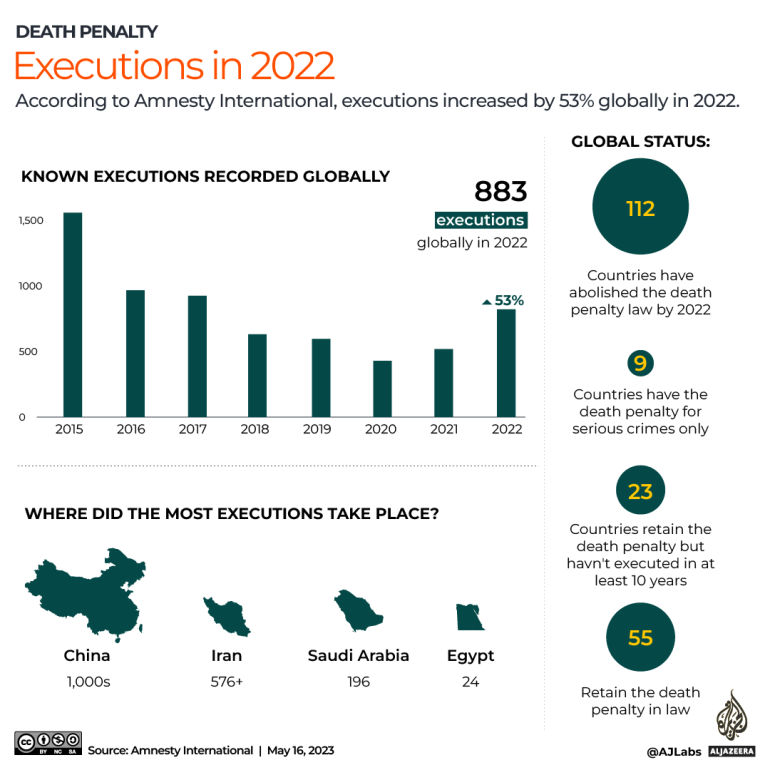



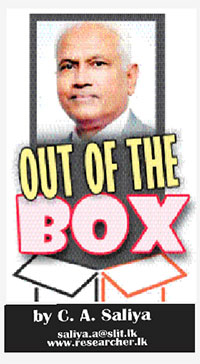 In the global political landscape of 2024, Reuters provides a comprehensive overview of key elections shaping the economic and geopolitical landscape across diverse regions. From Europe, where the rise of Eurosceptic far-right parties poses challenges to the European Union’s integration, to Russia, where Vladimir Putin is set for another term amid heightened tensions with the West, the report navigates through critical elections in Turkey, India, Mexico, South Africa, the United States, Britain, and Venezuela. The analysis underscores the potential market risks associated with each election, ranging from currency fluctuations, inflation and government bond concerns to geopolitical ramifications affecting international relations. As voters cast their ballots, the Reuters brief illuminates the intricate intersections of politics and economics, offering valuable insights into the potential trajectories of these nations and their impact on the global stage.
In the global political landscape of 2024, Reuters provides a comprehensive overview of key elections shaping the economic and geopolitical landscape across diverse regions. From Europe, where the rise of Eurosceptic far-right parties poses challenges to the European Union’s integration, to Russia, where Vladimir Putin is set for another term amid heightened tensions with the West, the report navigates through critical elections in Turkey, India, Mexico, South Africa, the United States, Britain, and Venezuela. The analysis underscores the potential market risks associated with each election, ranging from currency fluctuations, inflation and government bond concerns to geopolitical ramifications affecting international relations. As voters cast their ballots, the Reuters brief illuminates the intricate intersections of politics and economics, offering valuable insights into the potential trajectories of these nations and their impact on the global stage.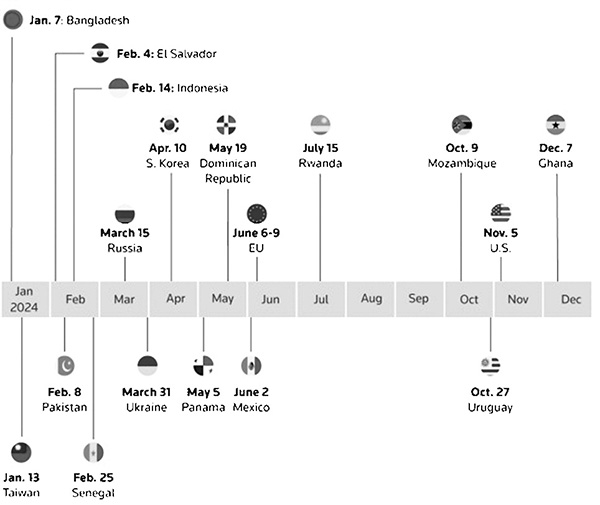 Europe: Elections are scheduled in Portugal, Belgium, European Parliament, Croatia, Romania, and Austria. According to analysts, Eurosceptic far-right parties are gaining momentum, potentially impacting the European Union’s legislative decisions. Market risks include potential effects on Italian stocks and bonds if eurosceptic parties gain influence, affecting European integration.
Europe: Elections are scheduled in Portugal, Belgium, European Parliament, Croatia, Romania, and Austria. According to analysts, Eurosceptic far-right parties are gaining momentum, potentially impacting the European Union’s legislative decisions. Market risks include potential effects on Italian stocks and bonds if eurosceptic parties gain influence, affecting European integration.